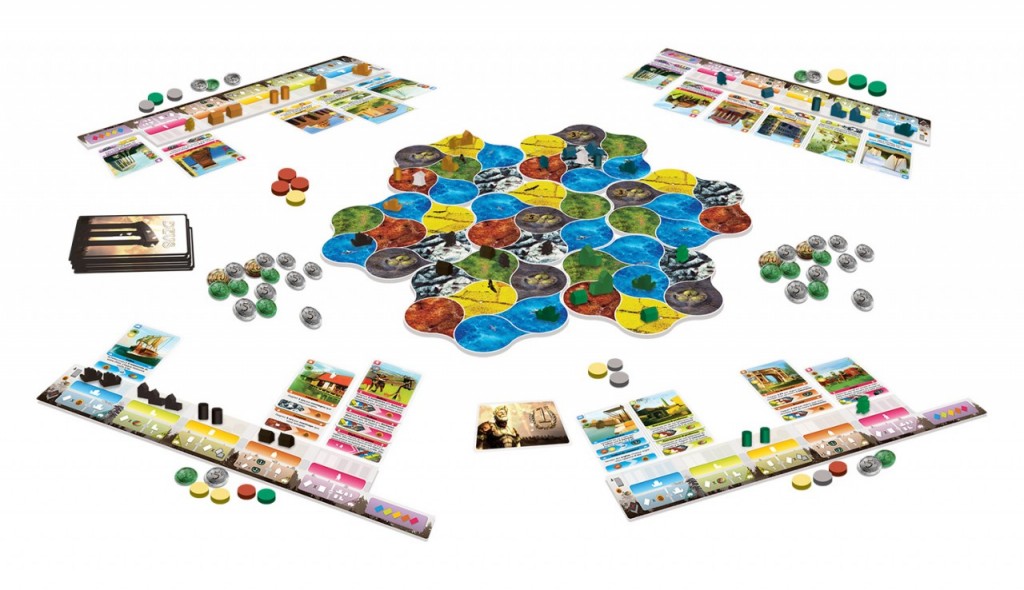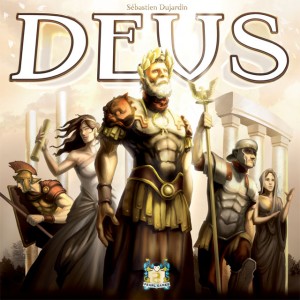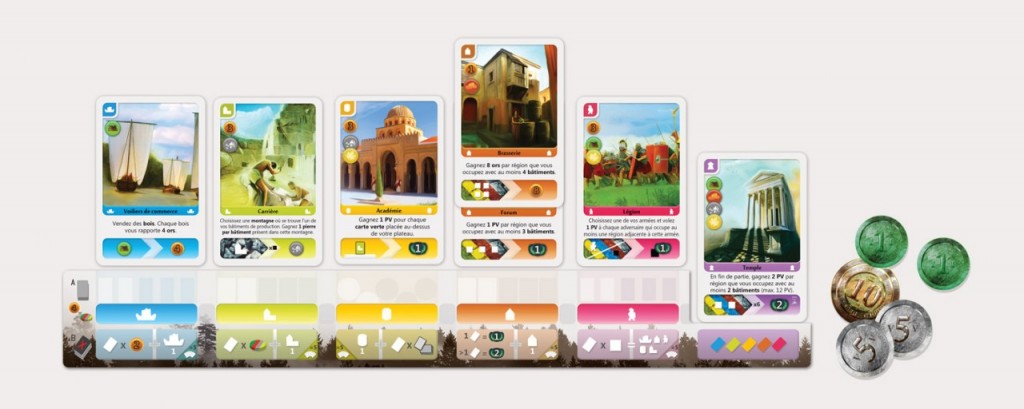Spiel 2014 Preview: Deus
Posted by James (admin) on September 23rd, 2014
 Deus is a game by Sébastien Dujardin (co-designer of Troyes and Tournay). It’s a game of ancient civilisation building, whilst trying to appease the gods, and contains some interesting sounding game mechanics.
Deus is a game by Sébastien Dujardin (co-designer of Troyes and Tournay). It’s a game of ancient civilisation building, whilst trying to appease the gods, and contains some interesting sounding game mechanics.
The board is made up of a number of hex tiles (well, they’re kind of rounded-off hexagons) which contain 7 regions on each consisting of 4 land regions (producing wood, stone, wheat and clay), 2 water regions, and 1 barbarian village. The layout on each tile is slightly different, and the tiles are placed together randomly each game giving some variety in replay.
Each player has a player board showing 6 coloured columns which each relate to a type of wooden building: civil, scientific, maritime (ships), military (armies), production, and temple. You start with some buildings on each column, cash, Victory Points (VPs), resources, as well as drawing 5 building cards from the common deck.
Each turn is simple: You can either construct a building, or make an offering to the gods.
Constructing a Building
You can construct one of the wooden buildings on your player board by playing a matching building card from your hand and paying the cost on the card. This allows you to place the wooden building on the main board, either in a region where you have a building (so long as you don’t have 2 of the same type in 1 region) or in an empty region adjacent to a region containing your building(s) – slowly spreading your presence.
So far, that all sounds fairly normal; however, Deus has an interesting game mechanic to add to this. After building, you also place the building card you used above your player board in the relevant column and then trigger the ability of each card in that column from top to bottom; so, if you just built your 4th civil building, you’ll have 4 cards to trigger. There is a general theme to the abilities of each type of card (i.e. red/military cards generally allow you to attack opponents; whereas, green/production cards generally generate resources, etc.) but cards of the same type each have different abilities within those themes.
Temples are similar but require you to have built a fairly even mixture of building types; however, these are worth lots of VPs. When all the regions around a barbarian village contain buildings, the village is immediately attacked and the player with the most armies around the village earns VPs. If you have no cards left after constructing a building, you draw 5 cards.
Offerings to the Gods
You can discard building cards to the gods to gain a special reward and also draw new cards. The reward earned is based on one of the cards discarded, and the more cards discarded, the bigger the reward. For example, if you discard 3 cards with a green card showing on top, you can draw 1 resource for each card discarded, plus 1 production building. Other card types let you gain gold, cards, VPs, and buildings (so they can be built later), plus most gains you 1 building too.
The game end triggers when either all temples have been constructed, or all barbarian villages have been attacked. Players add up the VPs earned during the game, as well as VPs for temples, and for having the most of each type of resource – Most VPs wins.
 Thoughts
Thoughts
The rules are pretty simple but it looks like the game contains lots of choices and a lot of elements to balance. You need cards and resources to build buildings, but need cards to gain resources and buildings, plus buildings give you special abilities to gain lots of things.
Discarding card adds an element of choosing which to use and which to discard (risking drawing ones that are less useful). I like you can discard cards so you can get rid of, and benefit from, cards in your hand that you don’t want. Also, I like that what you get from an offering is only based on one of the cards being discarded which is simple and flexible. It sounds like this gives the player some freedom to work with, and can reduce the effects of luck of the draw.
There’s the race for control of the main board. If a player finds they can not expand any further because they are surrounded (or even if just because they feel like it), they can start building elsewhere on the board (not adjacent to their current buildings) but this does cost VPs.
The production quality of the game looks really good with the modular board sections, wooden pieces, striking cards with a modern graphical style, and the player boards also act as reminders for players about what the different benefits are when making offerings. I enjoyed both Tournay and Troyes, and have enjoyed Pearl Games’ games too, so I am looking forwards to Deus.
More info, the rules and pre-ordering are available on Pearl Games’ Deus web page: bga.me/deus .
For more Spiel 2014 previews, check out my Spiel 2014 Previews page which lists the games on my radar with links to their previews too.
James.


